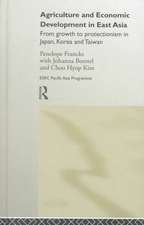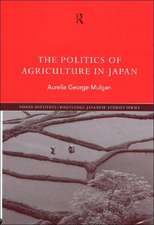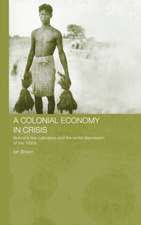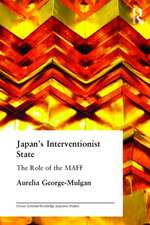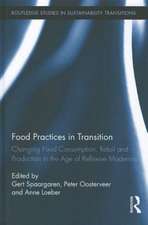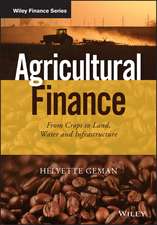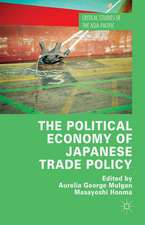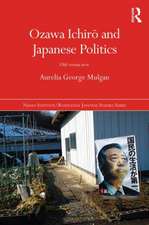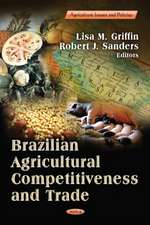Japan's Agricultural Policy Regime: Nissan Institute/Routledge Japanese Studies
Autor Aurelia George Mulganen Limba Engleză Hardback – 22 dec 2005
The author explains how the MAFF has safeguarded their institutional capacity to intervene by accommodating both public interest in agricultural policy reform alongside the interests of government in maintaining agricultural support and protection. The book provides a major reinterpretation of agricultural policy, examining how the MAFF’s role as an ‘intervention maximiser’ has been redefined in the face of continued bureaucratic involvement. Making available in English for the first time Japanese policy changes in the post-war period, the book will appeal to political economy specialists and political scientists, and those with an interest in Japanese politics and bureaucratic institutions.
Din seria Nissan Institute/Routledge Japanese Studies
-
 Preț: 286.71 lei
Preț: 286.71 lei -
 Preț: 318.39 lei
Preț: 318.39 lei - 9%
 Preț: 1003.97 lei
Preț: 1003.97 lei -
 Preț: 289.07 lei
Preț: 289.07 lei - 25%
 Preț: 852.53 lei
Preț: 852.53 lei -
 Preț: 495.94 lei
Preț: 495.94 lei -
 Preț: 486.42 lei
Preț: 486.42 lei -
 Preț: 271.61 lei
Preț: 271.61 lei -
 Preț: 420.08 lei
Preț: 420.08 lei - 18%
 Preț: 1057.40 lei
Preț: 1057.40 lei -
 Preț: 464.54 lei
Preț: 464.54 lei -
 Preț: 414.39 lei
Preț: 414.39 lei - 18%
 Preț: 1003.30 lei
Preț: 1003.30 lei - 18%
 Preț: 1056.80 lei
Preț: 1056.80 lei -
 Preț: 465.69 lei
Preț: 465.69 lei -
 Preț: 415.24 lei
Preț: 415.24 lei -
 Preț: 485.46 lei
Preț: 485.46 lei - 14%
 Preț: 298.13 lei
Preț: 298.13 lei - 18%
 Preț: 1061.57 lei
Preț: 1061.57 lei - 18%
 Preț: 1105.56 lei
Preț: 1105.56 lei - 18%
 Preț: 1055.69 lei
Preț: 1055.69 lei - 18%
 Preț: 1058.79 lei
Preț: 1058.79 lei - 18%
 Preț: 1165.24 lei
Preț: 1165.24 lei - 15%
 Preț: 538.45 lei
Preț: 538.45 lei -
 Preț: 415.67 lei
Preț: 415.67 lei - 28%
 Preț: 820.32 lei
Preț: 820.32 lei - 15%
 Preț: 511.27 lei
Preț: 511.27 lei -
 Preț: 492.11 lei
Preț: 492.11 lei - 18%
 Preț: 1271.47 lei
Preț: 1271.47 lei -
 Preț: 438.47 lei
Preț: 438.47 lei -
 Preț: 451.16 lei
Preț: 451.16 lei - 23%
 Preț: 342.12 lei
Preț: 342.12 lei -
 Preț: 408.54 lei
Preț: 408.54 lei - 18%
 Preț: 948.21 lei
Preț: 948.21 lei -
 Preț: 412.37 lei
Preț: 412.37 lei - 27%
 Preț: 1001.60 lei
Preț: 1001.60 lei - 18%
 Preț: 1061.57 lei
Preț: 1061.57 lei - 28%
 Preț: 849.77 lei
Preț: 849.77 lei - 26%
 Preț: 820.73 lei
Preț: 820.73 lei - 18%
 Preț: 1053.16 lei
Preț: 1053.16 lei - 18%
 Preț: 1390.04 lei
Preț: 1390.04 lei - 18%
 Preț: 777.75 lei
Preț: 777.75 lei
Preț: 1006.43 lei
Preț vechi: 1227.35 lei
-18% Nou
Puncte Express: 1510
Preț estimativ în valută:
192.57€ • 201.08$ • 159.02£
192.57€ • 201.08$ • 159.02£
Carte tipărită la comandă
Livrare economică 15-29 aprilie
Preluare comenzi: 021 569.72.76
Specificații
ISBN-13: 9780415366663
ISBN-10: 0415366666
Pagini: 256
Ilustrații: 2 Tables, black and white
Dimensiuni: 156 x 234 x 19 mm
Greutate: 0.63 kg
Ediția:1
Editura: Taylor & Francis
Colecția Routledge
Seria Nissan Institute/Routledge Japanese Studies
Locul publicării:Oxford, United Kingdom
ISBN-10: 0415366666
Pagini: 256
Ilustrații: 2 Tables, black and white
Dimensiuni: 156 x 234 x 19 mm
Greutate: 0.63 kg
Ediția:1
Editura: Taylor & Francis
Colecția Routledge
Seria Nissan Institute/Routledge Japanese Studies
Locul publicării:Oxford, United Kingdom
Cuprins
1 Introduction Bureaucratic Dependencies and Strategies of Intervention-Maximising Maximising MAFF Intervention in the Process of Agricultural Policy Reform 2 The Agricultural Policy Regime in Historical Perspective Maximising Ministry Intervention within Constraints Maximising Ministry Intervention in Historical Perspective The Agricultural Basic Law Incremental Liberalisation of Food Control Agricultural and Rural Public Works Conclusion 3 Agricultural Policies From the Late 1970s to the Late 1980s Antipathetic Trends in the Agricultural Policy Environment Fiscal Pressures on the Food Control System Appreciation of the Yen The Maekawa and Other Reports Pressures for Agricultural Trade Liberalisation The MAFF's Policy Response Deregulating the Food Control System and Cutting Costs De-Emphasising Price Supports and Fostering Core Farmers Embracing Internationalisation Further Reductions in Price Support Agricultural Trade Liberalisation Conclusion 4 Agricultural Policies from the late 1980s to the late 1990s The MAFF’s Policy Response Reforming the Food Control System The New Policies Rejecting Rice Tariffication at the GATT The Uruguay Round Agreement on Agriculture The URAA Countermeasures Package Agricultural Support and Stabilisation Price Trends The New Food Law The New Rice Policy Agricultural trade liberalisation and APEC Conclusion 5 Agricultural Policies from the Late 1990s The MAFF’s Policy Response Early Rice Tariffication New Rice Production Control Measures Preparing for the New Basic Law The New Basic Law Evaluating the New Basic Law Applying the New Basic Law i) Securing Stable Supplies of Food ii) Market Determination of Agricultural Prices iii) Direct Payments to Disadvantaged Areas v) Agricultural Trade Policy The Basic Plan The Drive for Efficiency and Accountability in Subsidised Works Expenditure Direct Income Supplementation The ‘Takebe Private Plan’ Invoking Import Safeguards The BSE Scandal Structural Reform Special Zones The Rice Policy Reform Outline WTO Agricultural Trade Policy Bilateral Free Trade Agreements (FTAs) The Entry of Ordinary Jointstock Companies into Farming The New Basic Plan Conclusion
Notă biografică
Aurelia George Mulgan is Associate Professor of Politics at the University of New South Wales, Australian Defence Force Academy, Australia. She has published widely in the area of Japanese politics and is the author of The Politics of Agriculture in Japan (Routledge, 2000), Japan’s Failed Revolution: Koizumi and the politics of economic reform (2002) and Japan’s Interventionist State (Routledge, 2005).
Descriere
This book charts the changes in Japanese agricultural policy in the post-war period and looks at the level at which such policy is designed by the Ministry of Agriculture, Forestry and Fisheries to protect its own interventionist powers




